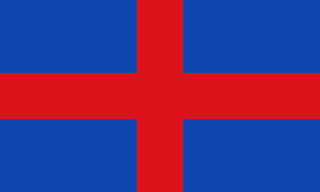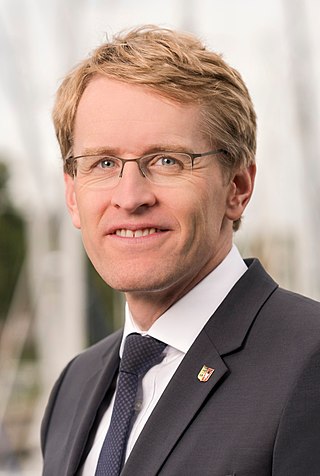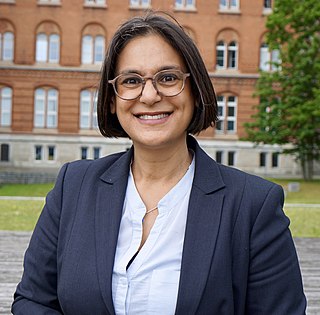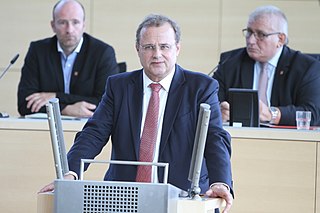
Ferdinand Tönnies was a German sociologist, economist, and philosopher. He was a significant contributor to sociological theory and field studies, best known for distinguishing between two types of social groups, Gemeinschaft and Gesellschaft. He co-founded the German Society for Sociology together with Max Weber and Georg Simmel and many other founders. He was president of the society from 1909 to 1933, after which he was ousted for having criticized the Nazis. Tönnies was regarded as the first proper German sociologist and published over 900 works, contributing to many areas of sociology and philosophy. Tönnies, Max Weber, and Georg Simmel are considered the founding fathers of classical German sociology. Though there has been a resurgence of interest in Weber and Simmel, Tönnies has not drawn as much attention.

The South Schleswig Voters' Association is a regionalist political party in Schleswig-Holstein in northern Germany. The party represents the Danish and Frisian minorities of the state.

Robert Michels was a German-born Italian sociologist who contributed to elite theory by describing the political behavior of intellectual elites.

Neumünster is a city in the middle of Schleswig-Holstein, Germany. With more than 79,000 registered inhabitants, it is the fourth-largest municipality in Schleswig-Holstein. The Holstenhallen and the Stadthalle make the city an important trade fair location.
Elections in Germany include elections to the Bundestag, the Landtags of the various states, and local elections.

Hinrich Lohse was a German Nazi Party politician and a convicted war criminal, best known for his rule of the Reichskommissariat Ostland, during World War II. Reichskommissariat Ostland comprised the states of Lithuania, Latvia, and Estonia, and parts of modern day Belarus.

The Free State of Oldenburg was a federated state that existed during the Weimar Republic and Nazi Germany. It was established in 1918 following the abdication of the Grand Duke Frederick Augustus II of the Grand Duchy of Oldenburg after the German Revolution and was abolished by the Allies following the Second World War.
The Tannenbergbund was a nationalist German political society formed in September 1925 at the instigation of Konstantin Hierl under the patronage of the former German Army general Erich Ludendorff. Part of the Völkisch movement, it was meant to counteract the Der Stahlhelm veterans association as well as the reorganized Sturmabteilung (SA) of the Nazi Party. The TB failed to meet the goal of a far-right collective movement and sank into insignificance long before it was officially banned by the Nazi authorities in September 1933.

The Schleswig-Holstein Landtag is the state parliament of the German state of Schleswig-Holstein. It convenes in the state's capital Kiel and currently consists of 69 members of five parties. The current majority consists of coalition of the Christian Democratic Union and the Greens, supporting the cabinet of Minister President Daniel Günther.

The Rural People's Movement was a farmers' protest movement in northern Germany from 1928 to 1933. Due to an agricultural crisis, demonstrations took place in numerous towns and cities in early 1928, and deputations were sent to Berlin to voice grievances against trade and tax policies. Farmers' continuing financial difficulties and dissatisfaction with their own lobby organizations led to more radical protests, especially in the province of Schleswig-Holstein, from late 1928. Passive resistance included tax strikes and the obstruction of foreclosures, but some farmers, with the assistance of nationalist radicals, resorted to terrorist methods. Throughout 1929 bombs were placed in public buildings, including the Reichstag. The Rural People's Movement ran its own newspaper "Das Landvolk" which was edited by Bruno von Salomon, the brother of Ernst von Salomon. With the arrest of the bombers and many of its leaders, as well as the rise of the Nazi Party, the Landvolk declined from 1930.
Charles Antoine Micaud was a sociologist, author and American professor. Born in France, he emigrated to the United States in 1936. He was a professor in the universities of Bowdoin College, Virginia and Denver. On 29 March 1941 he married Nancy Waddel.

The 2017 Schleswig-Holstein state election was held on 7 May 2017 to elect the members of the Landtag of Schleswig-Holstein. The incumbent government was led by Minister-President Torsten Albig, and consisted of the Social Democratic Party (SPD), The Greens, and the South Schleswig Voters' Association (SSW). The government lost its majority in the election.

Daniel Günther is a German politician who is a member of the Christian Democratic Union of Germany (CDU). Since 28 June 2017, he has served as the Minister President of Schleswig-Holstein. From 1 November 2018 to 31 October 2019, he served as President of the Bundesrat, being succeeded by Dietmar Woidke.

State elections were held in the Free State of Prussia on 24 April 1932 to elect all 423 members of the Landtag of Prussia. They were the last free election in Prussia, as the next election in 1933 took place under the Nazi regime, and Prussia was then abolished after World War II.

Serpil Midyatli is a German politician who has been serving as deputy leader of the Social Democratic Party of Germany (SPD), and chairwoman of the SPD in Schleswig-Holstein since 2019. She has been the Leader of the Opposition in Schleswig-Holstein since July 2021.

Aminata Touré is a German politician of Alliance 90/The Greens, the German green party, who has been serving as Minister of Social Affairs, Youth, Family, Senior Citizens, Integration and Equality of the State of Schleswig-Holstein since 29 June 2022. She was elected on 29 June 2017, at the age of 25, to the State Parliament of Schleswig-Holstein and served as the parliament's vice-president until 2022.
Carl Wilhelm Hahn was a German journalist, historian, archivist and head of the Schleswig-Holstein federal state’s so called Sippenamt during the Nazi regime. As an active Anti-Semite, member of the NSDAP and the Sturmabteilung, he was of considerable importance for the implementation of the Nazi racist policy in Schleswig-Holstein and beyond. After the end of World War II, he quickly managed to gain a foothold again and to cover up his commitment to Nazi racial policy. As early as 1951 he was seconded to the press office of the state chancellery in Kiel, and from 1957 he worked again in the state archive of Schleswig-Holstein in Schleswig. Reaching his retirement age in 1963, he was recognized as a respected figure in local media.

Claus Christian Claussen is a German lawyer, notary and politician of the Christian Democratic Union (CDU).

Bernd Klaus Buchholz is a German politician and lawyer. He served as Schleswig-Holstein Minister of Economic Affairs, Transport, Employment, Technology and Tourism.

Anton Leonhard Franzen was a German lawyer and politician of the Nazi Party. On 1 October 1930, he became the first Nazi to serve as a state government minister in the Free State of Brunswick. During his tenure as Minister of the Interior and Public Education, he attempted to remove the Party's political opponents and to pack the police and educational systems with Nazis. He resigned on 27 July 1931 and left politics, returning to the practice of law.





















